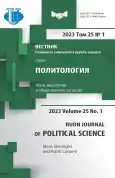The Concept of Political Correctness in Political Process of the Modern United Kingdom
- Autores: Golovin M.S.1
-
Afiliações:
- Chelyabinsk State University
- Edição: Volume 25, Nº 1 (2023): Ideas, Ideologies and Public Consent
- Páginas: 204-217
- Seção: IDEAS AND IDEOLOGIES IN THE INTERNATIONAL CONTEXT
- URL: https://journal-vniispk.ru/2313-1438/article/view/322253
- DOI: https://doi.org/10.22363/2313-1438-2023-25-1-204-217
- ID: 322253
Citar
Texto integral
Resumo
The concept of political correctness is essencial for the modern Western political process. The aim of the article is to find out its role and place in the political discourse of modern right-wing political organizations. The case of the British right-wing radical political party «Britain First» can be explained, firstly, by the popularity of the ideas of political correctness in UK, and, secondly, by the importance of criticism of the semantic content and symbolic nature of political correctness for ideologists the British far-right. The results of the study show that criticism of the ideas of political correctness occupies one of the central places in the ideological discourse of the right-wing radical party in UK, as well as in the rhetoric of both major British politicians and public perception. To sum up, it is worth noting that modern right-wing radical political parties, of which «Britain First» can rightfully be considered a vivid example, which actively, instrumentally and competently highlights this issues in their discourse. They realize the importance of transformation of their ideology and complementing its nationalistic the core of the agenda, which, in one way or another, affects the social, cultural and political processes in modern European states.
Palavras-chave
Sobre autores
Mikhail Golovin
Chelyabinsk State University
Autor responsável pela correspondência
Email: golovin.mihail@mail.ru
ORCID ID: 0000-0002-4339-4842
Senior Lecturer at the Department of Political Science and International Relations
Chelyabinsk, Russian FederationBibliografia
- Bourdieu, P. (2002). On television and journalism. Moscow: Institute of Experimental Sociology. Electronic publication: Center for Humanitarian Technologies. (In Russian). [Bourdieu, P. (1996). Sur la télévision: suivi de L’emprise du journalism. Paris: Liber-Raisons d’agir].
- Byshok, S.O. (2020). Migration and Recent Aspects of Right-Wing Populist Discourse in Europe. RUDN Journal of Political Science, 22(3), 443–457. http://doi.org/10.22363/2313-1438-202022-3-443-457 (In Russian).
- Caiani, M. (2017). Radical right-wing movements: Who, when, how and why? Sociopedia.
- Fairclough, N. (2003). Political correctness: the politics of culture and language. Discourse and Society, 14(1), 17–28.
- Golovin, M.S. (2020). Theoretical aspects and discursive practice of right-wing ideology in the political processes of modern Europe. Socium and power, 2(82), 29–40. (In Russian).
- Hu, L. (2021). Playing the Race Card: Did Racism Cause Anti-Immigrant Sentiment in Brexit? Dartmouth Undergraduate Journal of Politics, Economics and World Affairs, 1(2), Article 5.
- Leontovich, O.A. (2021). Political correctness, inclusive language and freedom of speech: the dynamics of concepts. Russian Journal of Linguistics, 25(1), 196–198. (In Russian).
- Mudde, C. (2007). Populist radical right parties in Europe. N.Y.: Cambridge University Press.
- Murray, D. (2019). The madness of crowds: gender, race and identity. Bloomsbury Continuum, London.
- Peterson, J., Fry, S., Dyson, M.E., & Goldberg, M. (2018). Political correctness gone mad? Oneworld Publications.
- Potseluev, S.P., Kurbatov, A.V., & Manik, A.S. (2021). Political correctness as political censorship: towards the irony of one concept. State and Municipal Management Scholar Notes, 1, 214–223. (In Russian).
- Ralph-Morrow, E. (2020). The right men: How masculinity explains the radical right gender gap. Political Studies, 70(1), 26–44.
- Scalcau, A. (2020) The paradoxes of political correctness. Theoretical and Empirical Researches in Urban Management, 15(4), 53–59.
- Schwartz, H.S. (2016). Political correctness and the destruction of social order. London: Palgrave Macmillan.
- Van Dijk, T.A. (2015). Discourse and power. Representation of dominance in language and communication. M.: Librikom. (In Russian). [Van Dijk, T.A. Discourse and power. Palgrave, 2008].
- Veretevskaya, A.V. (2018). Multiculturalism that was not: An analysis of European practices of political integration of ethno-cultural minorities. Moscow: MGIMO-University. (In Russian).
Arquivos suplementares









